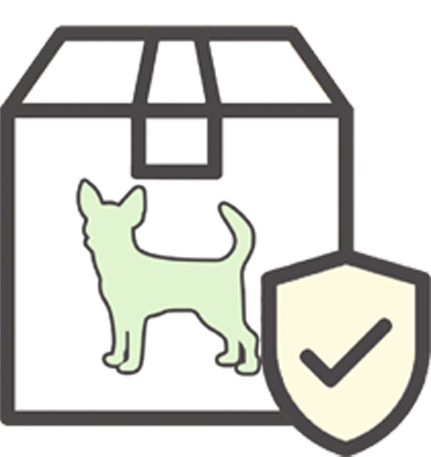4 Common Health Problems in Dogs
Friday, May 03, 2019 03:52:29 PM America/Los_Angeles
Dogs are just like people in that they can get sick and suffer from a variety of health issues. There are a number of reasons why your dog may become sick and while the average, well-cared for dog doesn’t usually get sick very often, there are times when health issues can occur. Some health issues with dogs are obvious and easy to identify, but some may be harder to notice. It is important to take your dog to the vet for health and wellness exams, which can help identify many health problems before they worsen. Always keep an eye on your dog for any signs of illness and be prepared for the times when they do get sick. Having a few supplies on hand, such as potty pads for diarrhea and vomiting will make cleanup easier and help you to recognize any changes in your dog’s fluid output. Here are a few of the most common health problems in dogs.
Ear Infections
An ear infection often causes dogs to scratch at their ears and shake their head. You may also notice some debris or discharge in their ear. An ear infection can be extremely itchy and pain and when left untreated, it can cause serious damage. If your dog is showing signs of an ear infection for longer than a day or two, you should schedule an appointment with the vet. In some situations, the persistent itching and scratching may lead to skin issues, that could become infected or the symptoms could be related to allergies. So, having your dog examined by the vet will help to clear up any confusion about the cause of symptoms as well as allow your dog to receive the appropriate treatment.

Urinary Tract Infections
Unfortunately, urinary issues are a common problem in dogs. It can be frustrating to deal with continuously changing pee pads or having to clean up accidents and many pet owners associate it with behavioral issues. But, these are signs that your dog may instead have a urinary tract infection. Signs of a urinary tract infection typically include:
- Excessive urination
- Increased thirst
- Inappropriate urination (peeing inside the house and off of their dog potty pad)
- Lethargy
- Whining or whimpering
Urinary tract infections can sometimes be avoided by taking your dog on frequent walks and encouraging him to eliminate regularly. Urine that remains in the bladder for too long can cause bacteria growth; ultimately leading to an infection. It is important to keep him hydrated and provide clean drinking water at all times. If your dog is susceptible to frequent urinary tract infections, ask your veterinarian for recommendations on ways to prevent them. It would also be helpful to have an indoor dog potty solution in your home, such as a DoggieLawn. It's not healthy for your dog to hold their urine so allowing them to have access to real indoor dog grass will help to prevent future urinary tract infections.
Gastrointestinal Disorders
Gastrointestinal disorders affect your dog’s intestines and stomach. They are often painful and may lead to other problems; gastrointestinal problems are also one of the most common issues with a dog’s health. The good news is that gastrointestinal problems are also an issue that pet owners can immediately notice. Some of the most common symptoms of gastrointestinal problems include:
- Diarrhea
- Vomiting
- Constipation
- Flatulence
- Regurgitation
- Weakness
Vomiting and diarrhea can quickly lead to dehydration, so it is important to react quickly and take your dog to the veterinarian, especially if the symptoms continue for longer than 24-hours. The best way to avoid gastrointestinal problems is to ensure your dog has good digestive health by eating a well-balanced diet. If your dog suffers frequent constipation, talk to your vet about including probiotics in your dog’s nutrition. Fixing the problem is often as simple as changing their diet. If your dog experiences frequent diarrhea, all the potty training you provided will go out the door. But, even though you are utilizing the wee wee pads, it is important to have your dog examined to ensure to the diarrhea isn’t leading to dehydration and to discuss alternative methods to prevent the diarrhea such as a change in diet.
Obesity
Unfortunately, obesity is quickly becoming one of the most common health concerns in dogs. Obesity is also one of the most easily preventable types of health problems. Obesity can lead to several serious health problems, such as heart disease, diabetes and orthopedic problems. The easiest way to prevent the risk of obesity in your dog is to ensure they eat a healthy, well-balanced diet and ensure they get plenty of exercise. If your dog isn’t used to going outdoors for regular exercise, start them off slow by going outside for a few minutes of play time and gradually work up to longer walks around the neighborhood or at the dog park. Sometimes the best thing to get your dog motivated to exercise more is by letting them experience playing real grass, so encourage frequent outdoor play. If you are concerned about your dog’s diet, talk with the vet about a recommended diet plan.
Taking care of a dog isn’t always easy and it requires time, effort and dedication. Keep in mind that your dog relies on you to notice when things just “aren’t right”. So, if you suspect your dog is sick, call your vet right away and arrange to have them examined as soon as possible. In certain situations, such as if your dog is vomiting after being outside, they may have eaten a harmful substance and you should take them to an emergency veterinarian hospital immediately. It's also a great idea to invest in pet insurance so you don't have to worry about your dog's medical bills. Check out this article on some of the top pet insurance companies.


